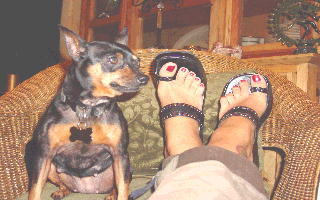A Solitary Samhain
This time of year is my absolute favorite! In addition to my Buddhist practice, I am also what is considered a Solitary. This means I practice my craft alone, and do not meet regularly with a coven.
Samhain is referred to "Halloween" because the Catholic church created All Saints Day (or All Hallows Day) on November 1st, in an attempt to turn people away from the original Pagan holiday.
The night before became known as "All Hallows Eve", which then got shortened up to Halloween.
If you are concerned about the Pagan nature of October 31st, then you should probably stop celebrating Christmas and Easter, too. Those holidays have been thoroughly adopted by the Christian religion, they originated as Pagan celebrations (Yule and Ostara). Halloween is the only holiday that has kept most of its Pagan meanings, without the Christian overtones.
In recent years, many fundamentalist Christian groups have begun an aggressive movement against the celebration of Halloween based on their belief of its association with demons and Satan. Their 'facts' are incorrect. One such misunderstanding is that Halloween celebrates the Celtic God of the Dead, Samhain. The Celts had no such God. The word "Samhain" more likely came from "samhuinn", which is the Gaelic word for "summer's end". A fitting name, since that is precisely what this holiday is celebrating.
Halloween has no Satanic association. Wicca, witchcraft or Paganism do not celebrate black masses, have sacrifical offerings or cast hexes.
Samhain is the third and last of the year's harvest festivals. Traditionally, it symbolized the crops being in, time for relaxation, and preparation for the long winter ahead. Samhain is a time to reflect on the events of the past year, and to honor those who have passed away.
Many covens and circles celebrate this most sacred of pagan holidays as groups, often opening their circles to non-initiates and others who wish to participate. Many solitaries prefer a solitary ritual, perhaps with some socializing earlier or later in the evening, as Samhain traditionally it is a communal celebration.
Samhain is pronounced as sow-in (in Ireland), sow-een (in Wales), and sav-en (in Scotland). It marks the end of the harvest, the end of the year, and the death of the god. Self-reflection is very important during this time of year. The Wheel of the Year should not turn without some kind of examination of the past year. I like to examine my life, both inside and out. What have I accomplished this past year? Have I emotionally grown? Did I walk the talk? Who was affected by my actions? Did I put good out into the universe? Did I grow or remain stagnant? Did I stay the path, or get distracted? Was I a good person, and true to myself? I try to address these questions in solitude and solemnity.
Just as Samhain ends the old year, it must begin the new, though many witches do not celebrate the New Year until Yule. In addition to backward reflection, I look forward to a growing sense of changes I will make in the New Year. I create lists during this time -- lists of what I have accomplished and what I still need to accomplish, things I have neglected and things I nourished. Just as Samhain symbolizes both the past and the future, illuminated by the cycle of the seasons, my lists do the same for me.
Samhain is the time when the veil between the living and the dead is thinnest, allowing communication with those (good and bad) who have departed. Hence the theme of renewal. Reflections on those who have passed along with reflection of our own “lists”, places special meaning to the “new year”. It reminds me of how my time here is passing. In my busy busy life, I tend to forget my lists written each Samhain.
Many of the symbols and traditions that we see around Halloween today can be traced to earlier times. Carving of jack-o-lanterns probably started with turnips rather than pumpkins, but the idea is the same either way. With the spirits of the dead travelling on this day, people would carve faces into turnips (or gourds or whatever) in order to scare away any evil spirits. The dressing up in costumes was also done to scare off bad spirits.
The idea of playing tricks was not done maliciously, but just as a way of having a bit of fun before the long dark winter settled in. The original gathering of treats was done to provide offerings to the Gods, in thanks for the harvest.
Blessed Be All.....and remember to honor your loved ones who have passed.
Labels: PagaN
 just gathering my thoughts....& wondering if u still stop by.....
just gathering my thoughts....& wondering if u still stop by.....

















